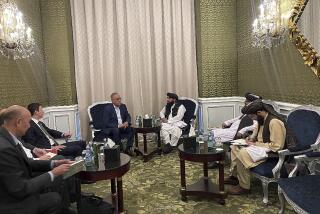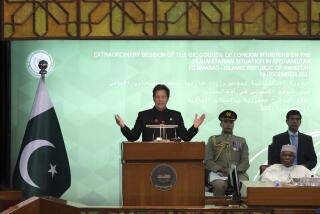Afghans Split on Security Issue
- Share via
KOENIGSWINTER, Germany — Afghan leaders working together for the first time in nearly 23 years to seat a transitional government--and cash in on billions in proffered foreign aid--appeared divided Wednesday over the need for foreign troops to police a country still racked by war, violence and banditry.
After an all-smiles opening session a day earlier here, the tough realities of the delegates’ task became apparent as U.N. brokers and diplomatic observers from 18 countries sought to steer the diverse group of warlords, politicians and religious leaders toward peace and democracy.
“The talks are not going to be easy,” U.N. spokesman Ahmed Fawzi warned after an apparently contentious gathering of the four delegations attending the summit. “As someone said, a single grain of sand can stop the machinery.”
The head of the Northern Alliance delegation, whose disparate forces now reign in much of the country, made clear Wednesday that his faction considers an international peacekeeping force unnecessary.
The three other groups representing Afghanistan’s former king and exiles in Pakistan and Iran have insisted that outside forces be brought into the country to ensure that Northern Alliance troops don’t abuse the power they have assumed in the wake of retreating Taliban fighters.
“We would prefer that security is looked after by Afghan forces themselves,” said Younis Qanooni, the lead delegate for the Northern Alliance’s political faction, which calls itself the United Front. He said that security is “in place” and that a broader ethnic and regional mix of Afghans could be brought together if improvements are needed.
Delegates and advisors of the three other factions, however, say an international peacekeeping force under a U.N. mandate is essential. Such a force would provide the security and stability needed while the transitional government works out procedures for elections and nation-building, they say.
A Directive to Resolve Two Issues
Devastated by more than two decades of occupation and civil war, Afghanistan is in dire need of the billions in reconstruction aid being offered by the international community on the condition that a reliable leadership with which donor countries can do business be put in place.
The Afghan delegates--38 official representatives and at least as many advisors--are sequestered at the elegant Petersberg hotel on a promontory overlooking the Rhine River, with a directive from their U.N. and German hosts to resolve two issues. They are to decide on at least the broad outlines of an “interim authority”--a Cabinet of 15 to 20 people to run government affairs for three to six months--and measures to improve security so that aid and international relations can resume.
The Cabinet would govern until a meeting of tribal elders--a loya jirga--can be convened and another provisional body is named to serve as a parliament for up to two years. By then, the organizers say, a constitution should have been drafted setting out procedures for elections and choosing a head of state.
Qanooni was dismissive of reports that the four delegations are nearing agreement that the transitional head of state should be the former king, 87-year-old Mohammad Zaher Shah.
“We don’t believe in the role of persons or personalities. We believe in systems,” he said of his faction’s attitude toward a possible return of Zaher Shah, who was deposed in 1973.
Qanooni’s suggestion that his group is still undecided about accepting the former king as interim leader may have been posturing aimed at securing more seats in the transitional Cabinet.
On the issue of foreign forces, although Qanooni repeatedly said his faction considers outsiders unnecessary, he stopped short of a categorical no.
“Our understanding is not that they’re refusing to discuss it but that they’re of the view that security is actually pretty good at the moment,” said James Dobbins, the U.S. special envoy to Afghanistan.
Dobbins said the positive tone set at the opening of the talks had continued into the second day, and he dismissed suggestions that there had been any noticeable setbacks.
Even Qanooni hailed the talks as a mission to which all parties were committed and said he expects to have “good news” to announce by the summit’s end. Organizers have said that the conference should wrap up by the weekend but that no firm deadline looms over the delegates.
Optimism About Prospects for Agreement
The slight, bearded Qanooni, in a suede jacket and silk tie, described his side as hopeful that agreement will be reached here on a transitional administration within two or three days.
But he hinted that the final details, such as names of all interim ministers, as well as the security force issue, will be decided only at follow-up talks in Afghanistan next month.
“We cannot expect to make our way back through the past 23 years overnight,” Qanooni, who serves as the Northern Alliance’s interior minister, told reporters as he fingered prayer beads with one hand and operated his microphone with the other.
A U.N. mediator here, Francesc Vendrell, also sought to lower expectations. “The atmosphere is very good,” he said. “But that doesn’t mean it will always remain very good.”
He said that drafting a complete list of interim Cabinet members in the next day or two is out of the question and that organizers will consider the conference a success if the parties are able to agree on a road map for moving from lawlessness to democratic rule.
He heralded the meetings in this town near the former German capital, Bonn, as a success just for having brought the rival parties together for discussions that have been calm and respectful.
Vendrell, the deputy to the U.N. special envoy for Afghanistan, conference host Lakhdar Brahimi, also indicated that the talks may last longer than the three to five days estimated at their start.
But Vendrell noted that the pressure of confinement could hasten an agreement, joking that people cooped up too long, even in a luxury villa, “start hating each other.”
More to Read
Sign up for Essential California
The most important California stories and recommendations in your inbox every morning.
You may occasionally receive promotional content from the Los Angeles Times.














